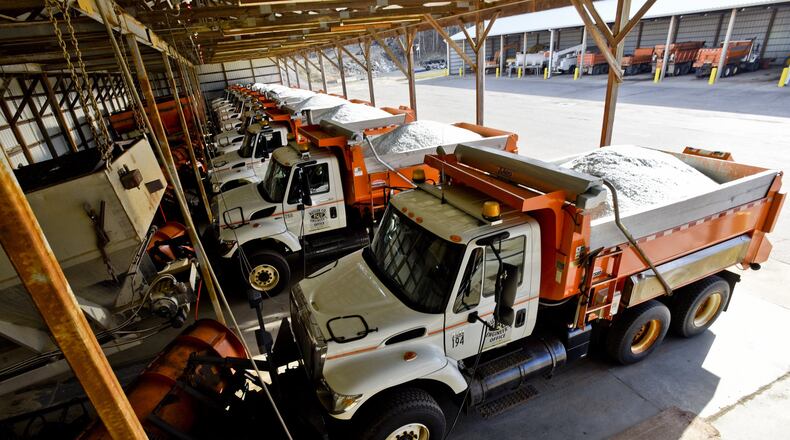“It’s got to be delivered, that costs fuel, this is to our door, that’s part of it. We’re up almost 12.6% but you hear me talk about asphalt, that’s up 40%...,” Wilkens said. “The cost increase is something you don’t want to see but it’s just the norm anymore, go to the grocery store.”
With prices like this, Wilkens said at least they no longer are required to purchase a minimum amount of salt as they had to in the past, because that caused storage issues for some of the townships when there were mild winters.
The bid covers 14 cities, townships and villages, the county water and sewer department and MetroParks. Hamilton, Middletown, Monroe and Ross Twp. are not part of the bid. Middletown Public Works Director Scott Tadych said the city participates in the Southwest Ohio Purchasers for Government, a consortium of 86 jurisdictions that bulk purchase goods like salt.
He said the group hasn’t gone out to bid yet this year but generally he has been able to get lower per-ton pricing with the larger bulk buys. Last year he paid $64.11 compared to Wilkens’ $76.29 price; his price in 2020 was $55.81 versus $74.71 for the county bid, but in the prior season it was $81.15 per ton compared to Wilkens’ $73.21 low bid.
“It’s hard to predict, it seems like when the previous winter was bad in my experience the prices go up the next season,” Tadych said. “But I don’t know, there’s not s lot of rhyme or reason to it sometimes.”
He said he usually orders 4,500 tons and budgets about $300,000 “but obviously that fluctuates in price.”
Jim Williams, public works director for the city of Hamilton said what is even more puzzling is it is not one price fits all through SWOP4G. His bid last year was $62.32, a difference of $1.79 from Middletown’s price, in 2020 it was $53.52, or $2.29 lower than Middletown. However, in 2019 Hamilton paid slightly more at $81.64 per ton for 3,500 tons.
SWOP4G could not be reached for comment on the disparity.
Williams said he doesn’t only rely on the SWOP4G process, he also gets his own bids from the six suppliers in the area and picks the cheapest price.
“Over the last six years we’ve seen this price all over board,” Williams said. “So sometimes it’s cheaper to get it through SWOP4G and sometimes it’s cheaper to go directly to one of those companies. How they do this from a rhyme or reason standpoint isn’t completely what I consider to be logical or clear.”
Wilkens said he prefers to do his own bidding because it gives him a bit more control.
“We’ve had pretty good luck on our own,” Wilkens said. “Sometimes they’re less, sometimes we’ve seen they’re a little more. We’ve got a little bit more control over our own destiny if we run into problems. That’s our main reason. We can get it when we need it typically.”
Ben Mann, Fairfield’s public works director said there have been issues with the SWOP4G program.
“The city of Fairfield has traditionally bid with the county engineer in order to control deliveries as there has been a time that SWOP4G had trouble getting deliveries during a shortage that did not effect the BCEO contract,” Mann said. “We also had an issue one year where we were locked into purchasing a minimum amount of salt when we didn’t need it and have since had any maximum or minimum purchase requirements removed from the contract.”
He said he has had discussions with Wilkens’ staff and they plan to revisit the bidding process as a group. He said they might make a change down the road, if they can “demonstrate both a savings in cost and assurance that we will be able to get the material we need if there are supply issues.”
West Chester Twp. Community Services Director Tim Franck said he budgets $200,000 for road salt and dealing with Wilkens makes the most sense.
“We’ve always partnered with the BCEO and it’s about more than price. We do benefit from the larger salt order partnering with other communities and the BCEO to buy larger quantities,” Franck said. “Probably just as importantly, the partnership with the BCEO has given us more certainty in the supply of road salt and makes the situation more seamless if we have to borrow salt — which we haven’t had to do in recent history — or if the BCEO trucks fill from our domes while treating county roads in West Chester.”
Ross Twp. used to be part of the Wilkens’ order but have since partnered with the Ohio Department of Transportation because they split the cost of a new salt barn that was built on township property. They pay the state for what they take from the barn and the price this year is $67 per ton, according to road superintendent Paul Bulach.
About the Author

